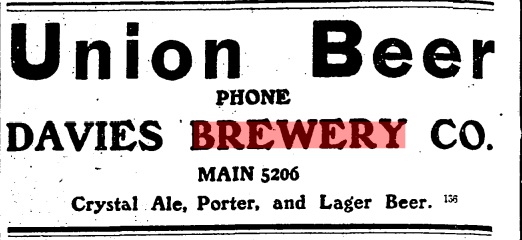Ed. Note: Sometimes paid work gets in the way of skylarking like this. Apologies to anyone who was waiting for a conclusion. We’ll get there eventually.
When last we stepped in the Wayback Machine, the labour situation in Toronto’s breweries had come to a head, although in the early days of the contretemps, it was pretty genial. The pickets outside of O’Keefes at Victoria and Gould were under the watchful eye of Brewery Secretary W. T. Kernahan, who, perhaps, believed a little too fiercely in the strength of his position.
“We turned out more beer yesterday than we have for six months and are making two brewings today. The strike has really done us a great deal of good, as we have got rid of a great deal of deadwood which has been around the brewery for years and have got much better men in their places. The men who went out on strike were by no means skilled labourers and we can take new men in and put them right to work. In fact, any brewer will tell you that you can get more and better work. We were paying $9 a week to men who would be killed if they had to do a day’s real hard work. One man, whose wages have been advanced to $15.75 a week because he has been here for a number of years has gone on strike and we have filled his place with a man for $9 a week who does just as good work.
The strike was declared on Thursday night at 12 o’clock. Friday morning at 7 O’clock we had all our wagons out with new men. This morning we turned away 15 men who came here hunting for work. In the bottling department we will employ boys and girls to do the wrapping and labelling and expect that they will be able to do work much more quickly. I do not think the strike will affect our customers who sell to the labor men. Our brewery has always been noted for its generosity to their employees. We will be able to supply our customers just as well as ever.”
Some of this is preening for the Toronto Star correspondent. The strikers have the minor advantage that delivery companies in the city are sympathetic and “one delivery company, the say were engaged, but upon a request from the union to remain neutral in the fight, the company withdrew their men. Today all other delivery firms in the city were notified.” Widmer Hawke, Eugene O’Keefe’s right hand man, is noted by the Star correspondent as handing out cigars to the pickets outside the brewery. It doesn’t really seem acrimonious for all of Kernahan’s puffery.
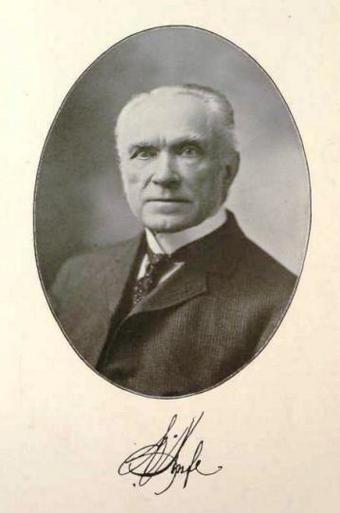
There is an issue, however. You may recall the erstwhile owner of The Cameron House, P.J. Mulqueen. As evinced by his treatment as a tied house owner who was meant only to stock the products of the brewery that owned the building he was leasing, there’s the potential of a real supply problem here. If you were a free house, you could stock anything you like, but the increase in the cost of licenses over the previous decade means that free houses are dwindling in number. How well can O’Keefe’s and Reinhardt’s Tied Houses function if they cannot take any delivery of beer? Additionally, the ownership of the tied house is public knowledge based on the beer that has been served there previously. Sympathetic unions can simply stop going to those hotels that are tied to these breweries.
By Monday, May 9, the brewers have entered into a sort of informal combine to prevent exactly the type of disaster and announce it in comparatively high dudgeon to the Star:
Since a strike was declared by the Union of the Brewery Workmen in the O’Keefe and Reinhardt breweries on Friday last, an organized effort has been made to boycott the beer of these two breweries, and we, the undersigned brewers of Toronto, desire to place before the public the attitude which the Brewers Association has assumed, in order that the public man understand that the treatment received by the workmen in the two breweries in question in no way differs from that received by the workmen in all the other breweries in Toronto. When the Workmen’s Union decided to declare a strike in two breweries, they might with equal cause have selected any other breweries in the city.
In April, 1903, the Workmen’s Union addressed a communication to each of the breweries in the city, demanding a substantial increase in wages. The brewers met to consider the request, and made enquiries to ascertain the wages that were paid to workmen doing similar classes of work and in almost every instance it was then found that our employees were receiving higher wages, but we knew that the cost of living had increased considerably, and we were prepared to grant them some increase. A committee of the employers was appointed to meet a committee of the workmen and after considerable negotiations, a settlement was arrived at by which the wages of all the employees were increased by amounts varying from 23 to 45 per cent of the wages before 1903…
Under the circumstances the other brewers of Toronto will decline to accept orders from the customers of the O’Keefe and Reinhardt breweries and we trust the public and the trade will do nothing to injure the business of the two breweries in question or anything to assist the workment in their unjust demands.
Cosgrave Brewing Co.
Copland Brewing Co. Limited
Dominion Brewing Co. Limited
Kormann Brewery Limited
Toronto Brewing and Malting Co. Limited
The O’Keefe Brewery Co. Limited
Lothar Reinhardt and Co.
Get that? The tied houses that cannot be supplied by the breweries people are striking at are also not going to be supplied by the other members of the combine. Right here at the beginning of the strike, the breweries announce that it is their intention to financially damage the publicans of the tied houses. Also, all of the brewery workers not on strike have just been told by their managers that since their conditions are exactly the same as those workmen on strike, that it could easily have been them on the picket line.
These are attitudes that might backfire.
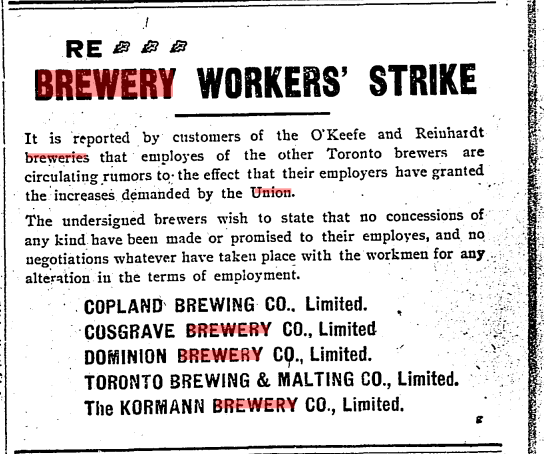
One note from a separate section of the paper the same day:
The striking brewery workers are waging a warm campaign among the different unions. The Typographical, Horseshoers’, and Bartenders’ Unions have passed resolutions of sympathy with the strikers.
It is said that in the event of the trouble between the employers and employees extending one of the greatest temperance campaigns ever waged in this city will be started. Every man who drinks alcoholic beverages will be asked to sign the pledge to abstain from drinking until the strike is over.
The strikers have been assured financial assistance by the International Union and an offer of similar assistance from the Bartenders’ Union has been refused. The expressment are giving the strikers their support and it is reported that the stationary engineers are likely to walk out should non-union firemen be employed in the breweries.
This is an era in which steam engines are actually denoted on the Goads Fire Insurance map for the city. You may recall from part one that a large section of downtown has burnt recently. Losing your engineers is almost as frightening as the threat of temperance. In some cases you get both.
May 10th in the Star:
At a special meeting of the Teamsters’ Union held in Society Hall last night it was decided not to haul beer from O’Keefe and Reinhardt breweries and a committee was appointed consisting of one man from each stable to notify the delivery companies of their decision. Several of the teamsters had refused to take beer from the two breweries and were discharged. The result was the meeting last night and the above determination. The men also agreed not to drink the products of the two breweries.
May 10th in the Globe:
The representative of the strikers said the men were not anxious for the bartenders to go out in sympathy, as the bartenders can render better assistance behind the bar than walking the streets, for they will not be over-zealous in their efforts to dispose of beer of the two companies.
If an attempt is made by the employers to fill the places of the bottlers and bottle washers with boys and girls, the local union will appeal to the Ministerial Association. The official cited a case of a brewery in Milwaukee employing between 2500 and 3000 girls and boys, some of whom were only nine and ten years old exposed to the surroundings of a brewery. He said that the Police Court records showed that a large percentage of those children had become criminals.
Tensions are beginning to run a little high. On May 14th, a wagon belonging to the Reinhardt Brewery is attacked.
The first act of violence in connection with the brewery workers’ strike occurred last night in Jarvis street between Adelaide and Queen Streets, where a crowd of about a dozen men attacked a Reinhardt wagon and dumped the beer into the street. The driver tried to escape by whipping up his horses but the attacking party boarded the vehicle and heaved the cargo overboard in short order. The driver was not maltreated in any way. He collected all his load except one eight-gallon keg which was confiscated by the men, who spoiled the symmetry of his cargo of wet goods. The men who attacked the wagon were not strikers, and the striking workmen this morning at their meeting expressed regret that the wagon had been molested.
“Tell whose who sympathize with us in our disagreement not to show their sympathy by any such lawless methods,” said an officer of the union to-day. “We countenance no overt actress. We are not going to use violence in this matter. We will win by peaceable methods or we will not win at all.”
According to the pickets on duty at the O’Keefe and Reinhardt breweries, the output this morning, the heaviest day of the week, is the lightest since trouble began.
Things continue in this vein for some time and eventually, by May 20th the brewers’ combine is beginning to work together:
They say that an attempt was made yesterday to deliver some beer from the O’Keefe brewery with a Copland brewery wagon and with O’Keefe’s horses and men. The consignee, a hotelkeeper in Queen street, refused to take the kegs, and they were taken back to the brewery.
At a meeting of the Executive of the Ontario Brewers Association yesterday, every brewer present pledged himself not to supply any of the customers of the breweries affected by the strike with beer. This affects not only the city, but the outside breweries.
Not only are they trying to work together on delivery, but they’ve ensured that no licensee unfortunate enough to be operating a tied house associated with O’Keefe or Reinhardt can order beer from any brewery in the province. So far that’s two weeks without new product for those tied houses.
May 21st:
About 100 bottlers who have been employed by the Cosgrave, Dominion, Toronto, and Copland breweries were laid off yesterday for an indefinite period. The reason given by the brewers is that there was not sufficient work for them to do. The demand for bottled goods has been slack all year, and the bottlers have only had work part of the time. The dismissal is said by the brewers to have nothing to do with the strike, but the strikers claim that it is an attempt to force their hands and make them call out all the union men. This, however, they will refuse to do. There is no truth in the story that there would be a general “walk out” at all the breweries to-night. The strikers say that they will not go back without the bottlers.
May 25th:
The lockout of union brewery workers, which has been expected ever since the trouble at the Reinhardt and O’Keefe breweries opened, has occurred. Yesterday, the unskilled union men employed by the Dominion, Cosgrave, Copland, and Toronto Brewing and Malting Companies were locked out by the brewers. This action was decided upon at a meeting of the Master Brewers’ Association, and resulted in the calling out to-day of every union brewery man in the city with the exception of those at Davies’ Don Brewery, which is paying the union scale.
There are now 300 men out. The majority of the men gathered at Richmond Hall this morning and were given instructions how to wage war against the brewers’ combination. There was quite a bit of suppressed excitement, but the men seemed confident that they will ultimately win out, though they expect a hard and long fight. They intend to watch the breweries closely and will pay particular attention to the Reinhardt and O’Keefe breweries. They have adopted an educational program of campaign and will endeavor to cultivate the taste of all union men in Toronto to Union beer.
“If this affair develops into a strong local option sentiment, the brewers need not blame us for it” remarked a leader of the strikers today.
The master brewers say that they are experiencing no difficulty in replacing the men who were locked out or went out with those who were notified that their services were no longer required. They say that their output will not be decreased to any extent and that they are assured that they will get all the men they desire.
The union men say that the breweries are practically closed and that agents of the brewers are endeavoring to seduce expert men from the union banner by all sorts of promises. The lockout affected only 100 men, but fully as many more followed.
About a decade from prohibition, brewery employees are threatening to move on local option temperance. It’s the brewery labour equivalent of mutually assured destruction. Is it a posture? It’s hard to say. As soon as you introduce the idea of destroying breweries entirely by outlawing their product, you’ve crossed some kind of line in terms of public representation of the issue. There is still violence occurring on the streets of Toronto as a result of this situation and this manner of rhetoric doesn’t help matters:
The Globe: May 26th
The first real trouble arising out of the brewery workers strike occurred last night in the Grand Opera House Saloon, when a crowd of young men spoke in strong terms of the beer manufactured by certain firms. Special Constable Cusick of the theatre was roughly used in a fight which followed. He was struck on the forehead with a stick and his neck and ear were badly torn … Before visiting the Grand Opera House Saloon the crowd created disturbances in two or three other hotels. It is stated they were led by two bartenders who gave up their positions because they were asked to serve non-union beer.
Let’s recap. At this point we’ve got local temperance societies involved in a brewery labour dispute. No brewery owned tied house in the city is getting beer delivered. Bartenders are roaming the streets picking fights with policemen. Brewery wagons are being attacked. On May 27th, the Stationary Engineers are expelled from the labour council because they were forced to hire non-union firemen.
On May 28th, the Globe mentions that the Licensed Victuallers Associations (IE the pub landlords who are being squeezed from all sides) met with the brewers in an attempt to bring this to some sort of conclusion. In the Star, we’re seeing further flung consequences in terms of labour solidarity:
Reports were brought in of the shipments of fifty cases of beer which went out yesterday from the Copland brewery. Shipments went to Smith and Frowley, both of Orillia; Broderick of Kingston, and a shipment to Collingwood. This output of fifty cases was the largest to go out yesterday. A peaceful quiet is reported from the precincts of the various breweries.
The Out-of-town organizing committee reports the hearty co-operation of the labour unions of Oshawa, Port Hope, Cobourg, Belleville, Thousand Islands, Kingston, Gananoque, Brockville, Collingwood, and Barrie.
It’s possible the brewers had to lay off the bottlers because demand immediately dried up for packaged beer within the province. Fifty cases is barely 1200 bottles. We’ve come a long way from Widmer Hawke good naturedly handing out cigars in just under a month.
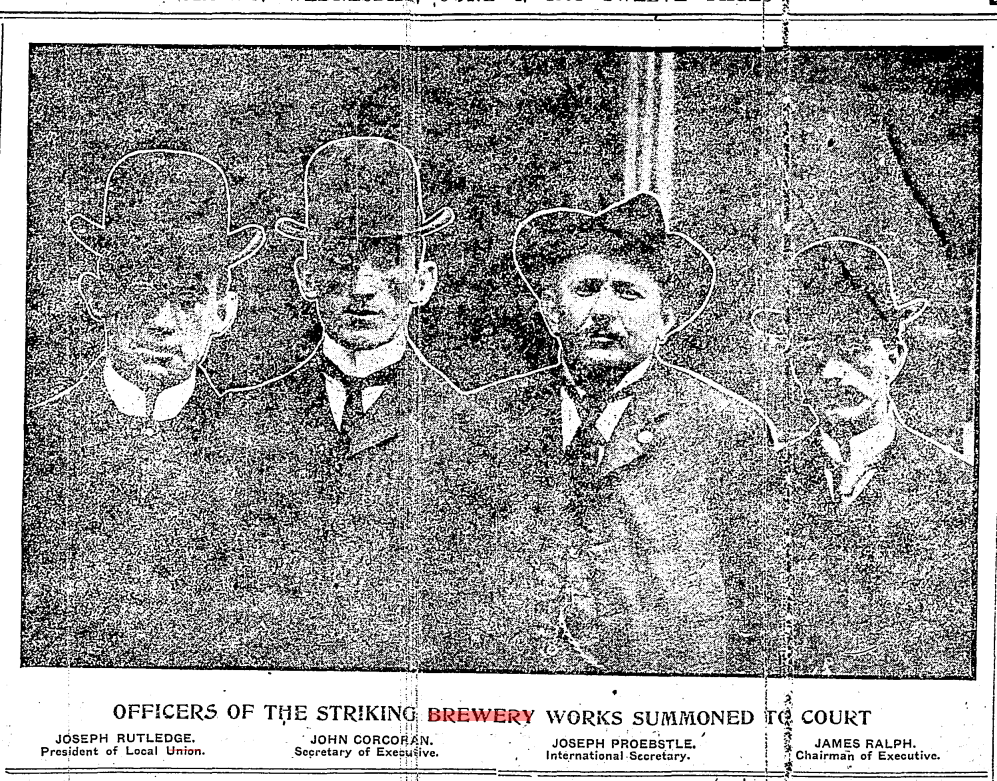
Toronto Star: June 1st
Unless the Brewers’ Association accedes to the demands of the union brewery men who are on strike, or were locked out before tomorrow night, the unionists of the city will force a vote upon local option and the officers of temperance organizations who are following the trend of events closely say that with the union men pledged to the movement, Toronto will be a “dry town.” There is much beneath the surface in this local option movement and the temperance people, recognizing this, are willing to take full advantage of the situation, and will battle shoulder to shoulder with the unions.
“They are bound to break us,” said a prominent officer of the Trades and Labour Council today. “The manufacturers are backing up the brewers and if we lose this fight, the employers will attack us all along the line, and strive to put us to complete rout. But we are not going to lose. We are in this fight to stay, and we are going to show every union man in town the exact position of affairs. They will give up their beer to beat the movement to crush us. We don’t want to destroy the brewers’ and hotelmens’ business, but if the brewers are to persist, we will do it.”
“If the brewers cannot afford to pay their workmen a living wage without raising the price of beer, why let them raise the price. It is the workingmen who have to pay the show, and we are willing to pay too. Think of fighting against a request for $10.50 a week! If the brewery men’s demands were unreasonable, we wouldn’t support them so determinedly, but they are not, and we will stand by them.”
The temperance people are standing by in the matter, but just as soon as the labour men are committed, they will put forth every effort to carry the by-law.
In the courts, the strike organizers are accused of entering into a conspiracy to harm the business of the breweries in the combine. The fact that 100 bottlers had been laid off and the employers have locked out the employees renders this somewhat ridiculous. A widely distributed circular has advised all union men in the city to boycott all the Toronto breweries except for the Davies Brewery, which pays a union wage. Lothar Reinhardt, it is noted at the foot of the article, is on the point of breaking from the Combine.
There’s one trick left up their sleeves. The Star from June 2nd, 1904:
Last night the Brewers’ Association offered Mr. Thomas Davies $55,000 for his brewery, the only union brewery in the city, but Mr. Davies refused to accept the money. It was rumoured around town today that the $55,000 was not offered for the business but as an inducement for Mr. Davies to join the other brewers and lock out the union men. Mr. Davies could not be found today to ascertain the conditions of the offer.
June 3rd:
The District Labour Council last night discussed the question of local option for the city. The special committee appointed to present a report on the question commended the proposition to enter upon a campaign to secure such a measure, but recommended that the matter be referred to the Executive Committee before final action was taken.
The sentiments expressed by the delegates indicated the strong feeling in favour of the Council petitioning the City Council to submit a by-law to the electors, but the feeling prevailed that if the campaign was entered upon it should be carried through to the end. It was pointed out that if the campaign was entered upon and the brewers acceded to the demands of the men there was a possibility of many voting against the measure who now would support it strongly. It is altogether probably that the Council will issue an ultimatum to the brewers declaring their intention to enlist the support of the temperance organizations and enter upon a local option campaign in the event of the striking and locked out brewery workers not getting the increase in wages demanded.
That’s what you might call a dead man’s switch.
Imagine you’re a licensee. You’ve done nothing wrong. You are tied to a brewery and your lease continues even if it becomes a dry town. The brewers now have the strikers, sympathetic unions across the province, the church in the form of the Ministerial Association, the District Labour Council, and a burgeoning temperance movement breathing down their necks. If you’re the pub landlord, siding with your business partner is likely to be ruinous, as is merely letting the situation play out. It’s no wonder the number of hotel licenses dwindle over the next decade.
One column over in the paper, we have demands:
The men claim that they are not asking any more than bare living wages. This is denied by the brewers, who say they are paying higher for the class of work done than any other employers in the city. The scale of minimum wages asked for is as follows: Washhouse $10.50; cellar, fermenting-room and brew house, $12.50; bottlers and other machine operators, $10.50; other employees in the bottling department, $10: Lager beers $12.50; Ale drivers, $11; helpers on wagons and stablemen, $10; firemen for seven days work, $12; all employees receiving higher wages to get a proportionate increase.
It’s at this point that the brewers become willing to enter into arbitration. Monday June 6th:
The master brewers have agreed to recognize the union, to employ none but union men, to discharge all the non-union men at present in the employ of the companies, and to take back all the strikers.
The employers say they cannot afford to pay the wages asked. They are paying now, they claim, more than is paid for the same class of labour in any other business in Toronto. “We pay $11.50 per week to our drivers for six hours a day,” said a representative brewer this morning, “and give our drivers a helper, while Hendrie’s and Shedden’s men, who work alone, only get $9.70.”
“But couldn’t you make it up by increasing the price of your products” was asked.
“No, we could not. Competition from outside, where they pay much lower wages is too keen. Why, we pay 150 per cent more in some departments than they do in some of the Ontario towns. In the bottling branch they employ boys where we employ men.”
“How about arbitration?”
“We are willing to arbitrate, each side to appoint two disinterested parties, and the decision of the four to be final. We will lay open all our books before such a board, so that they can examine and see if our statements regarding profits are not correct. If the men will consent to such an arbitration, they can go back to work tomorrow and they will be paid from that day whatever scale of wages is decided upon by the committee.”
The men are quite cheerful over the outlook. They are confident of getting nearly everything the ask for. “We’ll win in a walk,” said one of them this morning. Their ranks are still intact.
The next day, they’re awarded a temporary increase in wages from five to ten percent, with the new scale to form a basis for binding arbitration at a later date, which turns out to be the day after that. Brewery wages are standardized across the city, in some cases representing something more like ten to fifteen percent.
Let’s give the final word to the Toronto Star’s Labour column of June 11th, 1904:
On every hand the brewery employees are being complimented on the clean, straight, and sturdy fight made in their recent strike, and congratulated on the result. Many of the strikers were employees of many years’ standing with the firms with which they were connected. It called for no little courage on the part of these men to come out and stay out with the boys who were making a fight for better conditions. A principle, however, was involved in the fight, the right to organize, with a claim for the recognition of the organization, and it was the fight for this principle in the main which held the men together. On this ground as the international secretary, Mr. Proebstle, rightly declared, there was no room for arbitration. On the question of wages, the arbitrator may, under certain circumstances, step in, but no one has the right to prevent men from organizing within the law for their own protection. Now that a better understanding on this point has been arrived at, both sides may fairly be congratulated on the happy termination of the struggle. In the hands of Mr. D.A. Carey and Mr. Alfred Raynor, the interests of the men will be well looked after in the final settlement of the details of the dispute.
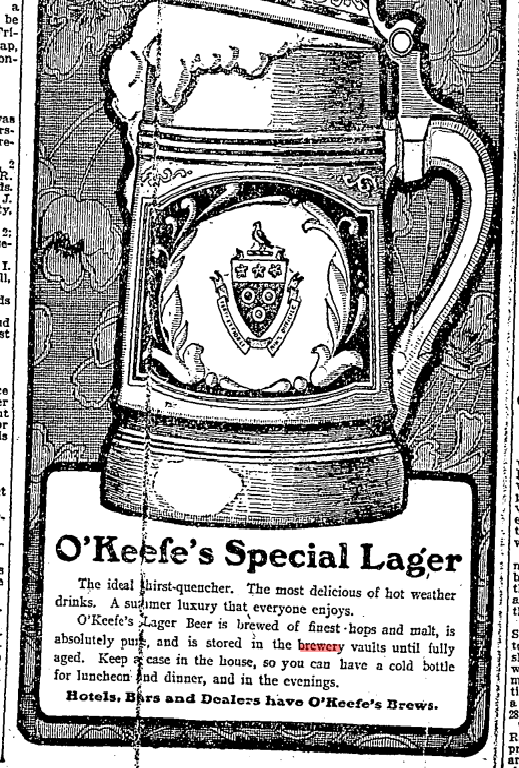
Next time, we’ll look at what lessons we can learn from the Brewery Strike of 1904, aside from the fact that labour should be compensated. Up to this point, this series has taken about three days of research and three days of writing. *cough*
